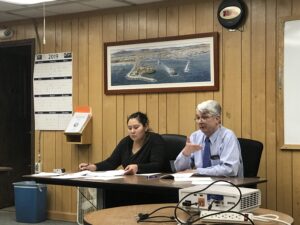Earlier this month, the newly-formed Nome-Beltz High School esports team played in their first-ever match against Lathrop High School. Nome’s esports coaches say these electronic sporting events are allowing students who aren’t part of traditional athletics, or other clubs, to get involved in school.
KNOM’s Joe Coleman has more:
“It’s gonna be a 3-0 sweep.”
– Aaron Blankenship
That’s one of the Nome esports team’s coaches, Aaron Blankenship with his pre-match predictions before the Lathrop vs. Nome matchup. Not everyone may understand what is happening when the Nanooks team says they’re competing in esports or in a game called Rocket League. Here’s Coach Blankenship with an explanation:
“Esports is pretty much the organized gameplay of any video game that is allowed at the school level.
– Aaron Blankenship
Esports is a newly-minted sport, recognized by the Alaska School Activities Association [ASAA], which was approved at an ASAA Board of Directors meeting this past April. ASAA currently allows for three different games to be played at the high school level.
In the state of Alaska, that’s the games of League of Legends, Rocket League, and Smite. In Rocket League it’s a lot like soccer, so you’re just trying to score more goals than the other opponent.”
– Aaron Blankenship
With the rising popularity of esports, Coach Blankenship says students are finding community in ways they might not have before.
“You’re really connected by the sports that you get to play, and for a lot of our students, if you’re into computers and not too much into cross country, basketball, volleyball, you don’t really have too many options for ways to get involved in the school, so for a lot of our students, we’re really trying to strive to give them something that connects them to the school.”
– Aaron Blankenship


“When you see a school reaching out not only to try to make sure that their cultural needs, their socio-emotional needs are being taken care of, but that their hobbies are cared about. When we show that schools care about what you do outside of school, even if it’s not something purely traditional like basketball, it shows the students that ‘yeah this school cares about what I do and they want me to do well in whatever I choose to do.’”
– Aaron Blankenship
Nome’s other esports coach, and the team’s primary coach for Rocket League, Matt Johnson, explains that connecting students to the school isn’t the only beneficial thing about esports.
“Yeah, it’s very difficult on a person – on a student – to have to travel every week, missing school, missing home, and just travel itself being very costly, so they have to fundraise every week. That is hugely difficult for the students and the teams to handle, and as an esports team we don’t have to deal with that.”
– Matt Johnson
As an example, Nome-Beltz Activites Director Pat Callahan explains just what it takes to get a traditional Nome sports team to an away game.
“Well typically, let’s say we’re gonna go to Kotzebue with a 19-seat airplane, that would be roughly $9,000, but you do is send your team to Kotzebue and have them send back another team and then that drops your cost in half to $4,500 per school. Then a lot of times that cost can be divided between two teams within the school itself so now you’re looking at maybe $2,500 per team.”
– Pat Callahan
Callahan also mentions that the school funds roughly 50% of the cost of travel.
For esports though, travel costs are eliminated and, according to Coach Blankenship, the fiber optic network needed to play the games on has already been in place for a number of years now. The only main difficulties have been getting the computers put together, which has already been addressed, and working out match times against teams from road system schools, who finish their day much earlier. Coach Blankenship adds that the benefits of esports don’t end there.
“And since we’ve started this program, we’ve already started to see students who are going above and beyond, trying to get their grades up; students who before this didn’t really have a reason why they were too interested in school and now they have this draw going in.
– Aaron Blankenship
With the required grades, Nome-Beltz has their top three Rocket League players taking on Lathrop: Bode Leeper, Owen Johanson, and leading goal-scorer Parker Kenick.
The Nanooks went up quickly two games to none in the best of five series. While they faltered a bit in the third game, going down 5-3 with less than a minute left, the Nanooks clawed their way back to win in overtime, proving Coach Blankenship’s prediction true. Blankenship then had words of praise for his team post-match.
“They’ve got this kind of glow when they come into the room and they’ve been walking with more of a swagger since we’ve got three people playing together and they’re actually playing, and they win all their normal matches.
– Aaron Blankenship
While Coaches Johnson and Blankenship highlighted areas for improvement, both coaches agree that the team is off to a good start with their 3-0 victory.
Image at top: Nome-Beltz students Bode Leeper, Parker Kenick, and Owen Johansen compete in a Rocket League match versus Lathrop High School as Coach Matt Johnson stands off to the side. Photo from Joe Coleman, KNOM (2019).





